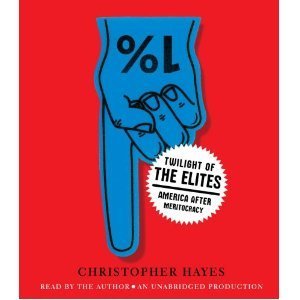Can We Get Along Without Authorities?

Some years ago, I watched a screening of a film about Daniel Ellsberg and the release of the Pentagon Papers. The film was shown in the U.S. Capitol, and Ellsberg was present, along with others, to discuss the movie and take questions afterwards.
I've just read Chris Hayes' new book "Twilight of the Elites," and am reminded of the question that progressive blogger and then-Congressman Alan Grayson staffer Matt Stoller asked Ellsberg.
What, Stoller wanted to know, should one do when (following the 2003 invasion of Iraq) one has come to the realization that the New York Times cannot be trusted?
The first thing I thought to myself upon hearing this was, of course, "Holy f---, why would anyone have ever trusted the New York Times?" In fact I had already asked a question about the distance we'd traveled from 1971, when the New York Times had worried about the potential shame of having failed to publish a story, to 2005 when the New York Times publicly explained that it had sat on a major story (about warrantless spying) out of fear of the shame of publishing it.
But the reality is that millions of people have trusted and do trust, in various ways and to various degrees, the New York Times and worse. Ellsberg's response to Stoller was that his was an extremely important question and one that he, Ellsberg, had never been asked before.
It's a question that Hayes asks in his book, which can be read well together with Chris Hedges' "Death of the Liberal Class." Hedges' book goes back further in U.S. history to chart the demise of liberal institutions from academia to media to labor. Hayes stays more current and also more conceptual, perhaps more thought-provoking.
Hayes charts a growing disillusionment with authorities of all variety: government, media, doctors, lawyers, bankers. We've learned that no group can be blindly trusted. "The cascade of elite failure," writes Hayes, "has discredited not only elites and our central institutions, but the very mental habits we use to form our beliefs about the world. At the same time, the Internet has produced an unprecedented amount of information to sort through and radically expanded the arduous task of figuring out just whom to trust." Hayes calls this "disorienting."
While I have benefitted from Hayes' brilliant analysis, I just can't bring myself to feel disoriented. I can, however, testify to the presence of this feeling in others. When I speak publicly, I'm often asked questions about how to avoid this disorientation. I spoke recently about the need to correct much of what the corporate media was saying about Iran, and a woman asked me how I could choose which sources of news reporting to trust. I replied that it is best to watch for verifiable specifics reported by multiple sources, to begin by questioning the unstated assumptions in a story, to study history so that facts don't appear in a vacuum, and to not blindly trust or reject any sources -- the same reporter or outlet or article could have valuable information mixed in with trash. Such critical media consumption may not be easy to do after a full day's work, I'll grant you. But it's not any harder to do than reading the New York Times and performing the mental gymnastics required to get what you've read to match up with the world you live in.



